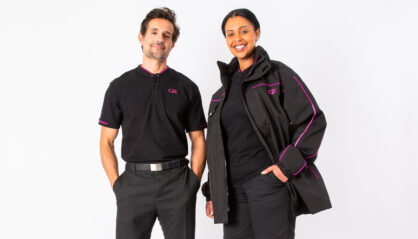Why Sustainable PPE Became a Must for Our Business

Our environment is currently facing decay, and the facts are there. Did you know that we’re currently using the equivalent of 1.5 Earths to provide us with the resources we need and to absorb our waste? By 2025 it’s predicted that we will need the equivalent of three Earths to sustain us if we keep up with the same pace.
With the rise of the eco-conscious mentality, businesses are on the lookout for new ways to reduce our consumption and waste, especially when it comes to fashion and the increased requirement for personal protective equipment (PPE) and uniforms.
How unsustainable is our fashion consumption?
The UK is one of the biggest contributors to fashion-induced pollution. The average person owns 115 items of clothing, but a shocking 30% of those clothes haven’t been worn.
In comparison with our European counterparts, including Italy, Germany, and France, our consumption is almost double theirs, averaging at over 26kg of clothing per person, per year. £140 million worth of clothes goes to UK landfills each year, so it’s clear this is a pressing problem.
A potential solution is to clean and hand down the uniforms of former staff members to new employees, thus enabling the reuse and recycling of work uniforms, including some PPEs, more often. We’re still not faring much better here though – 90% of the 16,000 tonnes of work clothes generated go to the landfill.
The environmental impact of single-use PPE
Can you recall last year’s PPE shortage that put NHS workers at a massive risk amidst the first wave of the COVID-19 outbreak? During the coronavirus pandemic, PPE and protective uniforms have never been more important. More have been manufactured, used, and disposed of than ever before, which is having an environmental impact.
Within the first six months of the pandemic, it was estimated that 106,478 tonnes of CO2 emissions were caused by PPE. As a response to the shortages in 2020, the government advised medical workers to reuse certain items of PPE, including fluid-resistant masks and respirators, but it was widely condemned by healthcare professionals and publications including the British Medical Journal.
PPE and uniforms remain vital in non-COVID medical settings such as surgeries, as well as other key sectors including retail, as we’re not yet out of the pandemic woods. As single-use PPE is impacting the environment, does the answer lie in reusable PPE?
Is reusable PPE the solution?
While reusing disposable PPE is not a viable option due to its limited level of protection and low eco-friendliness, why not look at creating reusable PPE for certain items? According to Jasmine Ho, clinical research training fellow at University College London, that is definitely an option. In an interview with the BMJ, she suggests that the UK follows the US in terms of creating guidelines for decontamination and reusable PPE. She says: “Changing culture and normalising reusables is one of the main things we want to do. There is almost a stigma associated with their use.”
The main question is which elements of PPE can be sustainably optimised without compromising safety. A study carried out on healthcare workers found that elastomeric half-mask respirators closely matched N95 masks on protection. These masks are mostly used in manufacturing and construction but rarely used in medical settings. This study has shown that they may be an effective solution for both safety and sustainability, providing they’re decontaminated effectively.
In response to a shortage of disposable PPE, reusable gowns and uniforms have also been trialled. Some of these clothing items can be used up to 75 times, vastly reducing the amount of waste produced by single-use gowns.
The need for PPE stretches beyond the healthcare industry. Key workers in sectors including retail and transport have been on the frontline with an increased risk of exposure to COVID-19. Providing reusable PPE and suitable workwear clothing may be more straightforward, as the requirements aren’t as stringent as in medical settings.
Businesses are venturing more into improving the sustainability of PPE by enabling key workers to use their own reusable face masks, as well as by purchasing uniforms made from materials that offer fluid-resistant protection. What’s more, some workwear and uniform manufacturers have created reusable, customisable face masks that offer the same three-layered protection as disposable masks. These masks can be given to staff as part of their uniform.
The UK is standing its ground in a number of crises, from managing COVID-19 to reducing our waste and overcoming climate change. These issues go hand in hand – our increased need for essential PPE during the pandemic has led to an increase in plastic waste, but there is a solution that can help us protect our key workers and reduce the single-use items we send to landfill – reusable PPE.
Sources
https://www.theguardian.com/politics/2020/apr/13/timeline-of-uks-coronavirus-ppe-shortage
https://jamanetwork.com/journals/jama/fullarticle/2763841
https://www.bmj.com/content/372/bmj.n270
https://www.bmj.com/content/369/bmj.m1577
https://journals.sagepub.com/doi/full/10.1177/01410768211001583





